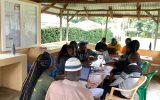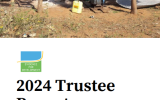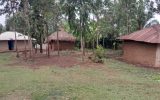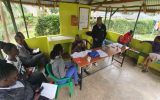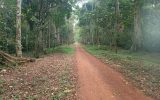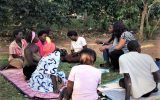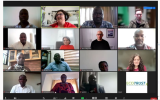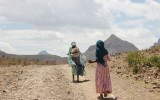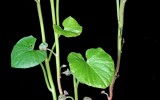News items
Showing items 1 to 15 of 39
View Categories
- Areas of expertise
- Capacity building
- Climate change
- Data
- Disasters and emergencies
- Famine prevention and food security
- Gender
- Income diversification
- Inequality
- Lake Victoria fisheries
- Livelihood resilience
- Livelihood Zones
- Livelihoods
- Monitoring and evaluation
- Nutrition and health
- Open source
- Policy and programme design
- Post-conflict
- Poverty research
- Refugees and displacement
- Social protection
- Technology
- Urban
- Vulnerability assessment
- Countries
- Hydromet
- Methods
- Resilience
- The organisation
-
New insights from latest EfD / Nasio Trust IHM study in Kenya
Assessment of household livelihoods in Mumias West Sub County, Kakamega County, Kenya. Climate change means farmers need to adapt and the Nasio Trust is taking on this challenge, supported by new insights that IHM studies are providing. Building on EfD’s initial training Nasio’s local staff team re-visited households interviewed last year (see report here-link to https://efd.org/reports/measuring-poverty-and-livelihoods-with-the-nasio-trust-a-baseline-village-study-in-kakamega-county-kenya/) […]
-
EfD Senior Associate, Stella Ngolka is exploring climate change impacts on livelihoods in Malawi’s tea sector.
EfD Senior Associate, Stella Ngolka is exploring climate change impacts on livelihoods in Malawi’s tea sector. She is conducting a PhD study based in the Walker Institute at the University of Reading. Malawi’s tea sector plays a pivotal role in the country’s economy and rural livelihoods. However, the sector faces severe challenges due to the […]
-
Read our latest Annual Report here
Read our full annual report for 2024 here: EFD Annual Report 2024 | Evidence for Development Interested to know more? Contact us here: efd.org/contact-us/
-
Measuring poverty and livelihoods with The Nasio Trust: A baseline village study in Kakamega County, Kenya.
Aware of increasing rates of poverty and growing demands on its services, The Nasio Trust which operates in western Kenya, commissioned EfD to conduct an in depth, quantitative household economy survey and training for its staff. The IHM study described in this report throws a clear light on the levels of poverty in Mumias West sub […]
-
A new partnership with the Nasio Trust (www.thenasiotrust.org)
EfD is delighted to be working together with the Nasio Trust on a long term project to support farming families in one of the poorest regions of Kenya. Our senior associate, Hosea Machuki, has been working with Nasio staff and partners in Kakamega district, introducing them to the Individual Household Method of data collection (IHM) […]
-
Floods, droughts, locusts and Covid: a longitudinal study of the past 4 years in Katakwi, Uganda
The NIMFRU project was designed to provide livelihoods impact-based flood forecasting. An extension on the project implemented in Katakwi District, Uganda, has meant that EfD Senior Associate James Acidri was able to return with Duncan Ongeng (Gulu University) to carry out a quantitative, longitudinal HEA study in one of the livelihood zones which was first […]
-
Investigating the impacts of environmental Forest Landscape Restoration on local livelihoods in Uganda
The TREETOPS project is looking at the impacts of environmental Forest Landscape Restoration (FLR) work on local livelihoods in Masindi district, Uganda. Evidence for Development are working on this NERC funded project with the Walker Institute (University of Reading), Makerere University, Uganda and Ecotrust, the Environmental Conservation Trust of Uganda. Despite a recent focus on […]
-
New paper published on adaptation planning
Evidence for Development’s Celia Petty is lead author of an new paper on adaptation planning, recently published in Frontiers in Climate, in the section on Predictions and Projections. The paper looked at the livelihood systems of lakeshore communities in Uganda and Kenya. Using the IHM and other research techniques we were able to identify specific […]
-
HEA and IHM online training: ALiVE I and ALiVE II
Despite the prolonged periods in 2020 and 2021 when travel to Uganda was not possible, Evidence for Development pressed ahead with the planned HEA and IHM training of trainers, funded through an extension to the HyCRISTAL project, HyCX. Covid restrictions meant transforming these planned ‘in person’ training events to a remote learning experience, delivered on […]
-
Datakind: What have Earth Observation and Machine Learning got to offer?
Evidence for Development celebrated the start of a new project with Datakind in December 2021, following a very rigorous selection process. As part of this new project, DataKind’s Data Ambassadors have been exploring whether machine learning can be used with geospatial datasets to create Livelihood Zone definitions. The aim is not to take local knowledge […]
-
Adapting for Tomorrow’s Environment
A new film ‘Adapting for Tomorrow’s Environment’ produced by our partner the Walker Institute describes some of the important work we are doing together in sub-Saharan Africa. In the film, EfD’s Patron Theo Sowa, CEO of the Africa Women’s Development Fund, describes the significance of the way in which we are working. She highlights the […]
-
Strengthening capacity within Uganda for climate change mitigation and adaptation
Evidence for Development has started work on HyCx, a new project which extends the HyCRISTAL programme of work, with the Walker institute, partners from Gulu University and stakeholders including farmers from Mukono district, Climate Action Network-Uganda (CAN-U) and the Uganda National Meteorological Agency. The HyCx project will strengthen capability within Uganda to take forward the […]
-
Cross-sector integration of climate science and livelihoods critical for effective Adaptive Social Protection
A new paper published in Climate and Development and co-authored by EfD’s Dr Celia Petty on the work of the ASPIRE (Adaptive Social Protection: Information for enhanced Resilience) project, has highlighted the importance of cross-sector integration of climate science and livelihoods information to ensure effective and timely triggering of targeted social protection systems to support […]
-
Improving models of under-researched tropical crops
Sweet potatoes are an important dietary staple and source of income across many parts of sub Saharan Africa, with some varieties providing an important source of Vitamin A for households. However, work to understand the potential impact that climate change will have on this crop and the people who depend upon it lags far behind […]
-
Redressing the balance: new work on climate change and its impact on livelihood staples in Uganda
Since the early 1970s, enormous efforts have been made to improve the yields and resilience of the world’s major cereal crops: maize, wheat and rice. Although these crops are the mainstay of global food security, in many parts of the developing world the population relies on other crops such as sweet potatoes, and far less […]
